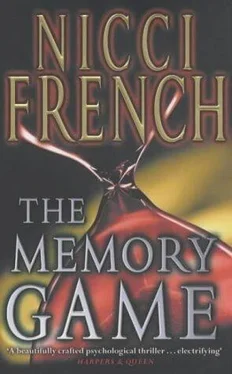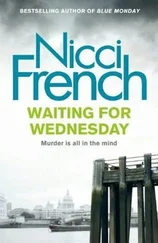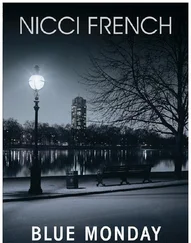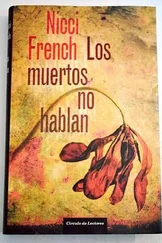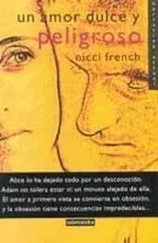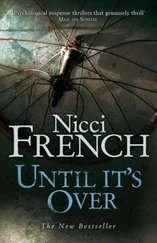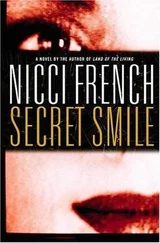Nicci French - The Memory Game
Здесь есть возможность читать онлайн «Nicci French - The Memory Game» весь текст электронной книги совершенно бесплатно (целиком полную версию без сокращений). В некоторых случаях можно слушать аудио, скачать через торрент в формате fb2 и присутствует краткое содержание. Жанр: Триллер, на английском языке. Описание произведения, (предисловие) а так же отзывы посетителей доступны на портале библиотеки ЛибКат.
- Название:The Memory Game
- Автор:
- Жанр:
- Год:неизвестен
- ISBN:нет данных
- Рейтинг книги:4 / 5. Голосов: 1
-
Избранное:Добавить в избранное
- Отзывы:
-
Ваша оценка:
- 80
- 1
- 2
- 3
- 4
- 5
The Memory Game: краткое содержание, описание и аннотация
Предлагаем к чтению аннотацию, описание, краткое содержание или предисловие (зависит от того, что написал сам автор книги «The Memory Game»). Если вы не нашли необходимую информацию о книге — напишите в комментариях, мы постараемся отыскать её.
The Memory Game — читать онлайн бесплатно полную книгу (весь текст) целиком
Ниже представлен текст книги, разбитый по страницам. Система сохранения места последней прочитанной страницы, позволяет с удобством читать онлайн бесплатно книгу «The Memory Game», без необходимости каждый раз заново искать на чём Вы остановились. Поставьте закладку, и сможете в любой момент перейти на страницу, на которой закончили чтение.
Интервал:
Закладка:
Helen gave a brief smile.
‘Yes, he’s right. One of the bases of the DNA oxidises and the strands crumble. And the DNA that was extracted from the recovered bones was 99 per cent contaminated.’
‘I don’t know what you’re talking about.’
‘It doesn’t matter. DNA fingerprinting is no use for this case but there is another technique that’s called polymerase chain reaction.’
‘What’s that when it’s at home?’
‘It’s a way of amplifying very small amounts of human residue. Of course, the DNA strands are still broken up but there are a great many repeats in the DNA sequence. And these little repeat sequences are characteristic and they are inherited.’
‘What does that mean?’
‘It means that Luke McCann wasn’t the father of Natalie’s baby.’
I felt my cheeks flush.
‘I’m terribly sorry, Helen. I’ve been stupid.’
‘No, Jane, it was quite understandable. Mr McCann was never arrested or even questioned under caution. So he wasn’t officially released, and so we didn’t announce the results of the test. In the light of subsequent events, we’ve decided to issue a statement this afternoon.’
‘Is the test reliable?’
‘Yes.’
‘God, Luke should have just said. It was my fault, though.’
We drank our coffee. Helen insisted on paying for herself. Then we walked across the square towards the police station. We halted outside and I prepared to say goodbye. Helen hesitated and spoke a little haltingly:
‘You and Theodore Martello, you went out together, didn’t you, that summer?’
‘That’s one way of putting it.’
‘Why did it, I mean, how did it end?’
‘Unhappily.’
‘He talks about you a lot, Jane.’
‘How would you know?’
‘Oh, you know, when I’ve talked to him. I told you before, I’ve talked to him quite a lot. On and off.’
She looked awkward but eager, and a thought – a rather terrible thought – flashed across my mind. I stared at her, and she flushed a bright, hot red. But she didn’t look away. I knew, and she knew that I knew; I wanted to say something, to warn her or tell her not to be foolish. But then, with a grimace, she turned rather clumsily and left me. I had a spare half hour on my parking ticket and used it walking around the centre of Kirklow, entirely heedless of my surroundings.
Fifteen
I found my life slipping – almost pleasurably – into a routine. The solid banks between which all the appointments and obligations and habits flowed were provided by the sessions with Alex Dermot-Brown. They had become as regular and unthinking as sleeping and eating. The morning bike rides along the canal, the weaving through the market to his house were now automatic. The visits accumulated in my memory and became comfortingly indistinguishable.
Session by session, I worked my way through what seemed to me to be everything about my life. I talked about my adolescence and Paul and my parents, but of course the story kept coming back to the Martellos, almost as if the Martellos constituted my story. They had always seemed to be at the centre of what was best about it. I described for Alex the childhood summer games. Other people had nostalgic, mythologised views of their early years: our shared childhood really was golden. I talked of my closeness with Natalie and Theo, and a great deal about Claud, as if I was trying to remake the relationship in my own mind, perhaps in a way that would justify my having left him.
It was hard to tell it as a narrative because our marriage hadn’t so much broken up as faded away. I couldn’t fasten on to any obvious reasons. There was no infidelity, certainly no violence, not even any obvious neglect. That wasn’t Claud’s style. In lots of ways I admired Claud more than I ever had. As I turned him into words, there in Alex’s back room, I felt that I was in danger of making him seem almost irresistible, and of appearing to be talking myself out of what I had already done.
Claud had been in his mid-thirties when he got his consultancy at St David’s and he’d turned out to be wonderful at the new responsibilities, all the committee work. Really wonderful. Apart from surgery, gynaecology is historically the area of medicine most dominated by men and Claud and I had always had subdued conflicts about the issue. But, as he might have said but never did, what could he have done as a senior registrar except make futile gestures and thwart his own career? Doctors who make trouble when they are young are the ones who somehow miss out on promotion. When Claud did become a consultant, this all changed. Of course, being Claud, it all seemed dour and unspectacular and it took time, most notably for his opponents, to see what was going on. What Claud was doing was instituting a committee on the role of female gynaecologists in the profession. When people cottoned on there was a real storm. There was a court case, there was an editorial in the Daily Telegraph or somewhere, but Claud was a match for them all.
When we were children, it was always Claud who knew what wire went where on the plug, and what time the last train left and all the things nobody else bothered about, and he showed the same grasp of detail at the hospital. Other people huffed and puffed while Claud didn’t say very much at all, but at the crucial moment it was always Claud who had talked to the right people on the committee beforehand or who had somehow got the agenda immovably fixed according to some arcane rule that nobody else knew about. The result was that during the past seven years, every single gynaecological appointment at St David’s had gone to a woman. He was a hero. And it was clever as well, because he had caught the mood that wasn’t yet prevailing. He had got the bandwagon moving before jumping on it.
The odd thing was that Claud never once came to me and said ‘I told you so’. He never explained to me that he had been keeping his powder dry all those years so that it could be used when it would be effective. I wish he had, but he was always rational and modest about his achievements, insisting that gynaecology had been wasting its resources and that he was only doing what was efficient. Besides, he said, under the new contract system, the female gynaecologists were more co-operative and flexible. Maybe Claud is the sort of person who accomplishes major reform, an instinctive conservative who admits change in order to save as much of the old system as he can. Maybe. But, in the evenings, there was no detectable difference between the Claud who had swung an entire department behind his proposals against all the odds and a Claud who had failed. This detachment served him brilliantly over the years but it came to repel me.
Claud’s triumphs were part of what settled my feelings about him. If I felt nothing for him after what he had achieved, then our marriage really must be in trouble, I reasoned. How does a marriage go wrong? I almost wish I could say that I had caught him in bed with his secretary or one of his adoring female house officers. Claud would never have been unfaithful to me and I knew he would be a loyal husband until one of us died, if only because he had been witnessed signing a document to that effect in a registry office on 28 May 1973. It was all just little things and the lack of little things.
Sex, of course. See under ‘Lack of’. When we were first married we had a passionate sex life and Claud was rather elegantly good at it. I don’t just mean tactile manipulation but that he seemed to have the whole thing worked out. More than any man I’d ever slept with (a fairly small number, who could be counted on the fingers of two hands) Claud saw sex not just as an impulse but as a part of affection, friendship, humour, tenderness, consideration. I adored it and him.
Читать дальшеИнтервал:
Закладка:
Похожие книги на «The Memory Game»
Представляем Вашему вниманию похожие книги на «The Memory Game» списком для выбора. Мы отобрали схожую по названию и смыслу литературу в надежде предоставить читателям больше вариантов отыскать новые, интересные, ещё непрочитанные произведения.
Обсуждение, отзывы о книге «The Memory Game» и просто собственные мнения читателей. Оставьте ваши комментарии, напишите, что Вы думаете о произведении, его смысле или главных героях. Укажите что конкретно понравилось, а что нет, и почему Вы так считаете.
